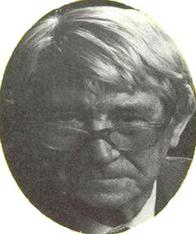Eliot Slater

Eliot Trevor Oakeshott Slater, (August 28, 1904 – May 15, 1983) [2]
was an British psychiatrist and eugenicist with interests in chess, music and poetry [3]. In 1935 Eliot Slater married Lydia Pasternak [4] [5], sister of Boris Pasternak, Russian poet and writer, and published a collection of his poetry, The Ebbless Sea, Poems (1922-1962) [6] .
Contents
Factor of Mobility
At the Conference on Information theory, September 26-29, 1950 in London [7] under the topic of Application of Information Theory to a Study of the Sense Organs and the Central Nervous System, Slater contributed with a Statistics for the Chess Computer and the Factor of Mobility, which was controversial discussed by D. K. C. MacDonald, F. L. Stumpers, Alan Turing and Jack Good [8] . Slater's paper was the first to attempt the significance of mobility in chess and his data based on 350 master games provides clear evidence of employing mobility as a feature in evaluation.
Alan Turing
Quote by Alan Turing on Slater's paper [9] :
I wish to make two points concerning Dr. Slater's paper. I was greatly interested by the statistics provided, but fear that some people might draw invalid conclusions from them. It might for instance be thought that a good way of playing is to maximize one's mobility at one's next move, or perhaps to minimize that of one's opponent at his next move but one. It is evidently not feasible to foresee mobilities many moves ahead. Although the immediate mobility is a useful measure of the relative advantage of the players in normal play it by no means follows that it is wise to direct one's play to maximizing such a measure. To do so would be like taking a statistical analysis of the laundry of men in various positions and deciding, from the data collected, that an infallible method of getting ahead in life was to send a large number of shirts to the wash each week.
Eliot Slater
Eliot Slater in reply [10]:
Dr. Turing's argument by analogy what a naive laundry worker might conclude about ways of becoming rich really amounts to the suggestion that strategic advantage is the cause rather than the product of an advantage in mobility. I do not think that this can be accepted. An advantage in mobility usually appears in a game a number of moves before strategic advantage is detectable in other ways; it seems to be an essential aspect of what chess-players understand by "development"; and it supplies the decisive criterion of winning or losing.
Poems by Doctors
The British Journal of Psychiatry (2008) [11]:
Eliot Slater is best known for his seminal applications of rigorous basic statistical and genetic research methodologies to the study of mental health problems and for demonstrating that temporal lobe epilepsy was associated with schizophrenia-like psychoses. Yet strong literary interests and associations ran through his life. He married Lydia Pasternak, the sister of the Russian poet and novelist, and was himself a published poet.
In retirement he undertook and completed a PhD (later published) in which he made a strong case for Shakespeare as author of an early play of disputed authorship (Edward III) by the use of sophisticated numerical measures (cliometrics) [12] [13]. He was also an Editor of the British Journal of Psychiatry (1961–1972) who introduced the yellow colour for the cover.
Selected Publications
- Eliot Slater (1950). Statistics for the Chess Computer and the Factor of Mobility. Proceedings of the Symposium on Information Theory, London. Reprinted (1988) in Computer Chess Compendium, pp. 113-117. Including the transcript of a discussion with Alan Turing and Jack Good
- Conel Hugh O'Donel Alexander, Eliot Slater (1955). The Relative Strengths of the Openings. The British Chess Magazine, LXXV, 6, June 1955
- Dap Hartmann (1987). How to Extract Relevant Knowledge from Grandmaster Games. Part 2: the Notion of Mobility, and the Work of De Groot and Slater. ICCA Journal, Vol. 10, No. 2
External Links
- Eliot Slater from Wikipedia
- ETOS - Eliot Slater Archive
- German Eugenics in Practice, by Eliot Slater, 1936, Eugenics Review (vol. 27:4), ambivalent review of sterilization and marriage laws
- Insulin Therapy for Schizophrenia from An Introduction to Physical Methods of Treatment in Psychiatry (First Edition) by William Sargant and Eliot Slater (1944, Edinburgh, E & S Livingstone).
References
- ↑ Eliot Slater's contribution from Gresham College (no longer available Microsoft PowerPoint Slides)
- ↑ Psychiatr Bull MR 7 (9): 175 (pdf)
- ↑ Eliot Slater from Wikipedia
- ↑ Probleme/Projekte/Prozesse: Die Pasternaks in »Charlottengrad« (German)
- ↑ Lydia Pasternak Slater, Poet, Is Dead at 87 - The New York Times, May 19, 1989
- ↑ The ebbless sea: Poems (1922-1962) from amazon.com
- ↑ Conference on Information theory, 26-29 September 1950
- ↑ Computer Chess Compendium, (David Levy ed.), pp. 115-117. Discussion on Dr. E. Slater's paper
- ↑ Conference on Information Theory, London 1950
- ↑ Computer Chess Compendium, (David Levy ed.), pp. 115-117. Discussion on Dr. E. Slater's paper
- ↑ Poems by doctors - Eliot Slater from The British Journal of Psychiatry (2008) 193, 72, (pdf)
- ↑ Eliot Slater (1975). Shakespeare: word links between poems and plays, N&Q 220 , 157–63
- ↑ Eliot Slater, published (1988). The problem of The reign of King Edward III - a statistical approach
- ↑ Eliot Slater Archive | Chess